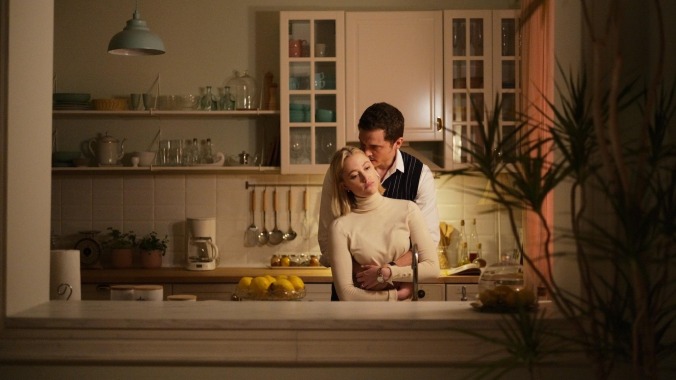Watcher wants you to believe your eyes—and then judges you for it
Maika Monroe stars in a thriller that uses language and cultural barriers as battle-of-the-sexes metaphors

On its face, Watcher is a fairly conventional narrative about a woman and a possible stalker in the apartment across the road. But director Chloe Okuno has more on her mind than Repulsion-like “woman alone going crazy” vibes, or even Rear Window’s audience-indicting voyeurism. Okuno is more concerned with one simple message: believe women. Her heroine Julia (Maika Monroe) never doubts her suspicions and fears, and never has to, because every man around her is there to do that for her. The differences between how men and women perceive threats are always forefront in Okuno’s narrative, a (mis-)understanding gap she literalizes by relocating the American Julia to Bucharest, where her inexperience with the Romanian surroundings reiterates the differences in the metaphorical languages spoken by the sexes.
Julia is there thanks to her Romanian-American husband, Francis (Karl Glusman), whose bilingual skills just scored him a big job in the country’s capital. He has to translate for her; she in turn must trust that the few locals who do speak some English mean her no harm. But when a serial killer of young women strikes the area, it’s easy for her to see danger everywhere. Especially when a shadowy figure in the neighboring building keeps staring into their apartment window every night.
When Julia and Francis first enter their new place, it’s at night, the main light doesn’t work, and it looks a dingy beige. Come morning, in full light of day, everything’s a clean white. It’s an easy visual shorthand for how ridiculous nighttime fears may seem once exposed to sunlight. And indeed, for a while we simply see Julia hang around the apartment, or walk around town. A viewer might imagine that this was simply a convenient, low-budget way to make a movie, by just filming one actress alone in an Airbnb.
But a couple of shots that pull back and out from the living-room window suggest something more is up. For a moment, our point of view is that of a watcher, if not necessarily the precise one of the title. Monroe, with her classic beauty and platinum blonde hair, is the sort of actress people like to watch onscreen, whether she’s not doing much of anything significant, or having jeans-on sex with Francis on the couch. It’s okay, because she’s an actress in a movie, and watching is what we’re meant to do. But what if she weren’t, yet a voyeur wholeheartedly believed otherwise?
